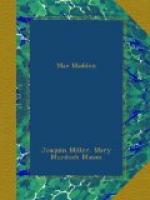Mae wandered off to the kitchen, as usual, that day, for another of Lisetta’s stories. The Italian, with her glibness of tongue and ready fund of anecdote, was transformed in her imaginative mind into a veritable improvisatore. Talila was not by any means the only heroine of the little tales. Mae had made the acquaintance of many youths and maidens, and to-day Lisetta, after thinking over her list of important personages, chose the Madre Ilkana as the heroine of the occasion. Mae had already heard one or two amusing incidents connected with this old mother. “I am sure she has a cousin in America,” she asserted to-day, before Lisetta began, “for I know her well. She knits all the time, and is as bony as a ledge of rocks, and her eyes are as sharp as her knitting-needles, and her words are the sharpest of all. Her name is Miss Mary Ann Rogers. Is she like the Madre Ilkana?”
Lisetta shook her head. “No, no, Signorina, La Madre is as plump and round as a loaf of bread, and as soft as the butter on it. She has five double chins that she shakes all the while, but then she has stiff bristles, like a man’s, growing on them, and her knitting-needles and her words are all sharp as la Signora Maria Anne R-o-o-g-eers, I doubt not. But her eyes! Why, Signorina, she has the evil eye!” This Lisetta said in a whisper, while Giovanni shrugged his shoulders bravely, and little Roberto cuddled closer to Mae.
“Yes,” continued Lisetta, “and so no one knows exactly about her eyes, not daring to look directly into them, but as nearly as I can make out they are black, and have a soft veil over them, so that you would think at first they were just about to cry, when suddenly, fires creep up and burn out the drops, and leave her hot and angry and scorching.
“She must be terrible,” cried Mae, with a sudden shrinking.
“She is terrible,” replied Lisetta, “but then she is very clever. You will see if she is not clever when you hear the story I shall now tell you,” and Lisetta laughed, and showed her own one double chin, with its two little round dimples. Then she smoothed down her peasant apron, bade Giovanni leave off pinching Roberto, and commenced.
“The government hates the banditti,” began Lisetta, wisely, “and indeed it should,” and she looked gravely at Giovanni, “for they are very wild men, who live reckless bad lives, and steal, and are quite dreadful. But we poor, we do not hate them as the government does, because they are good to us, and do not war with us, and sometimes those we love join them—a brother or a cousin, perhaps,”—and Lisetta’s black eyes filled, and her lip quivered. “As for the Madre, she loved them all, and said they were all relations.




